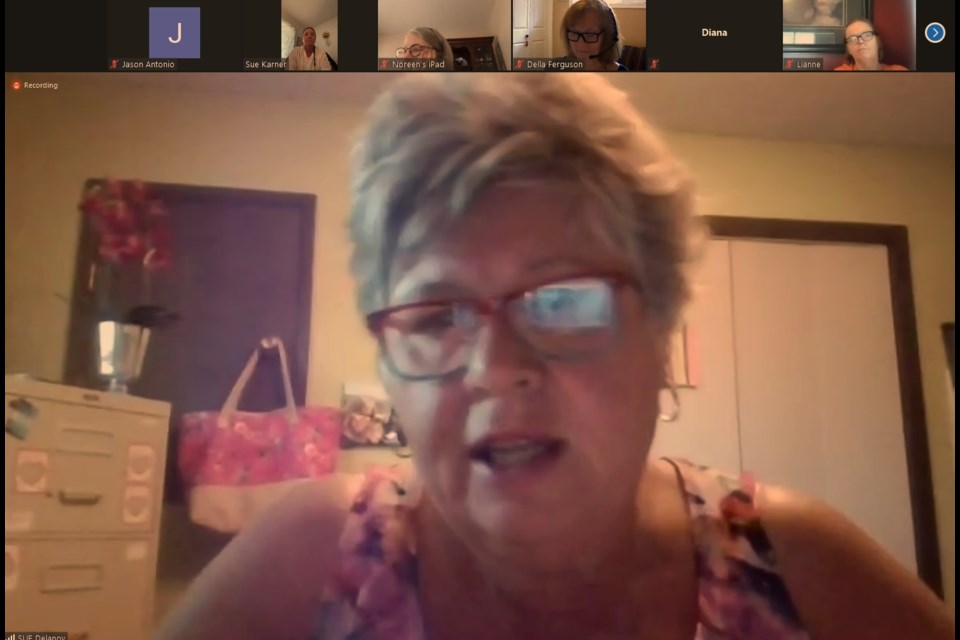The justice system needs to change so fewer women end up in jail and lose their children, which means increasing community supports and decreasing the construction of new jails, a child-care advocate says.
Women should receive community-based sentences with supports instead of being given lengthy jail times since such sentences would lessen the public’s worry about the punishment given, said Sue Delanoy, the former executive director of the Elizabeth Fry Society (EFS).
In Saskatoon, a court program put women in the community to serve their time, with one stipulation being they had to have adequate housing, she continued. However, there was very little suitable housing then, and there is little adequate housing now, which is a problem since some women are sent back to the places where they had issues.
A second change Delanoy wants to see is for the building of new jails to stop. She pointed out that Saskatoon is constructing a bigger building for male inmates.
“What are we doing here, building bigger jails? That is ridiculous. Like, you build it and they will come sort of thing?” she exclaimed. “We don’t need bigger jails, we need better support systems, so I’m totally against that.”
A final change the former EFS executive director wanted to see is for the provincial government to fund harm reduction programs. If Saskatchewan doesn’t control its addictions and mental health issues, then “we’re all hooped as a society.”
Delanoy spoke on July 8 during a lunchtime presentation hosted by Square One Community Inc., an organization supporting low-barrier living for homeless and vulnerable people in the community.
Her talked focused on the over-incarceration of women — many of whom are young mothers and most of whom are Indigenous — and the need for a comprehensive child-care system for families.
The former EFS executive director has worked for more than 40 years advocating for children, youths, and child-care and working with youths and women caught in prostitution and gangs.
Community supports
There are many reasons why women end up in prostitution and gangs, but one way to address these issues is for society to support families so they have a strong start and can succeed, including providing child-care support and a strong minimum wage, Delanoy said.
However, child care has “remained an enigma” and has not improved during the past 20 years in Saskatchewan, she added. Although some spaces have been added over the years, the system is not as “robust” as it could be.
In the late 2000s, Delanoy became the executive director of the Elizabeth Fry Society and planned to stay for one year to help the organization get back on its feet. Ten years later, she realized that she had developed a passion for working with incarcerated women and this era became a highlight of her life.
“But I was so naïve of the justice issues. … I found the conditions of the women incarcerated were ridiculous,” she said. “A lot of the things most people don’t know about, I became aware of.”
Indigenous viewpoint
Delanoy, 65, hired “the best team ever” to support the organization and the women it represented. Over time, the EFS shifted from having mostly non-Aboriginal staff to having mostly Aboriginal women, with many having gone through the justice system.
Some things she learned working for the organization were that: most women in jail are in their mid-20s, approximately 90 per cent are Indigenous, most live in poverty, many have addiction issues, and many have an average of 3.5 children who become displaced when their mothers go to jail.
The society aims to provide services to women before, during and after their incarceration, including ensuring they had the basics for survival, Delanoy continued. But, while great people are doing good work to help others, the system itself is fragmented and unreliable.
People lose everything after they’ve been sent to jail, from their kids to their homes and possessions. Delanoy and her team bought numerous beds and other household items for women after they had been released and were forced to start over — sometimes repeatedly.
“Let’s face it, you don’t always get it right the first time you try to do it,” she said. “But what you need is a strong resolve and a strong support system around women and families … . We just can’t give up on people.”
Child-care spaces
Delanoy believes that adequate child-care placement can help mothers get through their time in jail, while such support is the “equalizer for everybody” regardless of race or socioeconomic status. Saskatchewan specifically needs to move from a licensed child-care model to an agency approach that supports women who work irregular hours or want to rejoin the workforce.
“We are a child-care desert,” she said, pointing out that while Saskatchewan and Manitoba have roughly similar populations, the former has 15,000 licensed daycare spaces and the latter has 60,000 spaces and thinks that’s not enough.
While the Saskatchewan government adds roughly 1,000 child-care spaces every year, that won’t meet the needs of families unless something “drastic or innovative” is done, Delanoy continued. Instead, she thought the province needed a dedicated public policy that embraces $10 per day child care.
“If we have good child care, none of this (the issues women and families face) would ever happen,” Delanoy added.
For more information, visit childcarenow.ca.




